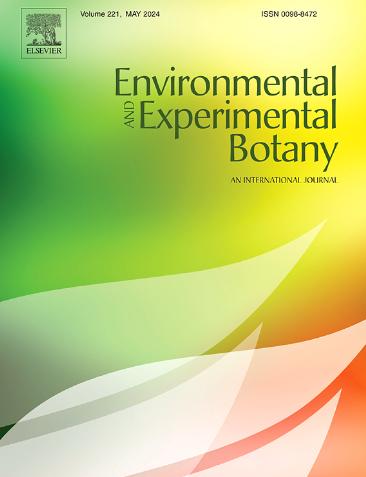宿主遗传塑造了黑松在干旱条件下的表型可塑性,并与根系相关的土壤微生物群变化有关
IF 4.5
2区 生物学
Q2 ENVIRONMENTAL SCIENCES
引用次数: 0
摘要
在当前和未来的气候条件下,确定抗旱树种、树木基因型以及树木与其根系相关土壤微生物群之间的有益相互作用,对于维护树木健康和维持日益脆弱的森林变得越来越重要。我们设计了一个基因型×土壤×浇水×时间的玻璃温室实验,以辐射松为模型树,评估宿主基因型和根相关土壤微生物组对干旱下表型响应(功能性状、代谢组、养分)的影响程度。我们发现莽草酸途径是辐射松抗旱的关键代谢途径,其中莽草酸中间体是最强的干旱信号之一,此外还有黄酮类和苯丙类等下游代谢产物。总之,我们发现宿主基因型多样性是所观察到的辐射松对干旱的表型响应的关键因素。相比之下,微生物组只起了次要的辅助作用。与我们的假设相反,在干旱胁迫下,干燥的土壤无法支持对干旱敏感的基因型。相反,抗旱基因型能够利用当地的适应性细菌来应对当地的选择性干旱压力,但却牺牲了树木的生长。这凸显了找到树木基因型与互生微生物群落的特定组合,从而在未来环境压力下茁壮成长的重要性。本文章由计算机程序翻译,如有差异,请以英文原文为准。
Host genetics shapes Pinus radiata phenotypic plasticity under drought and is linked with root-associated soil microbiome shifts
Under current and future climate scenarios, identifying drought-resistant tree species, tree genotypes, and beneficial interactions between trees and their root-associated soil microbiomes is becoming more imperative for maintaining tree health and sustaining increasingly vulnerable forests. We designed a genotype x soil x watering x time glasshouse experiment using Pinus radiata as a model tree to assess the magnitude of the effect of host genotype and root-associated soil microbiome on the phenotype response (functional traits, metabolome, nutrients) under drought. We identified the shikimate pathway as a critical metabolic pathway for Pinus radiata drought resistance, with the shikimic acid intermediate being one of the strongest drought signals, besides downstream metabolites such as flavonoids and phenylpropanoids. Overall, we found that the host genotype diversity was a key actor in the observed phenotype response of P. radiata to drought. In contrast, the microbiome was attributed a minor supporting role. Contrary to our hypothesis, dry soils could not support drought-sensitive genotypes under drought stress. Instead, the drought-resistant genotype was able to leverage locally adaptive bacteria to match local selective drought pressures at the expense of tree growth. This highlights the significance of finding specific combinations of tree genotype and mutualistic microbial communities that would thrive under future environmental pressures.
求助全文
通过发布文献求助,成功后即可免费获取论文全文。
去求助
来源期刊

Environmental and Experimental Botany
环境科学-环境科学
CiteScore
9.30
自引率
5.30%
发文量
342
审稿时长
26 days
期刊介绍:
Environmental and Experimental Botany (EEB) publishes research papers on the physical, chemical, biological, molecular mechanisms and processes involved in the responses of plants to their environment.
In addition to research papers, the journal includes review articles. Submission is in agreement with the Editors-in-Chief.
The Journal also publishes special issues which are built by invited guest editors and are related to the main themes of EEB.
The areas covered by the Journal include:
(1) Responses of plants to heavy metals and pollutants
(2) Plant/water interactions (salinity, drought, flooding)
(3) Responses of plants to radiations ranging from UV-B to infrared
(4) Plant/atmosphere relations (ozone, CO2 , temperature)
(5) Global change impacts on plant ecophysiology
(6) Biotic interactions involving environmental factors.
 求助内容:
求助内容: 应助结果提醒方式:
应助结果提醒方式:


